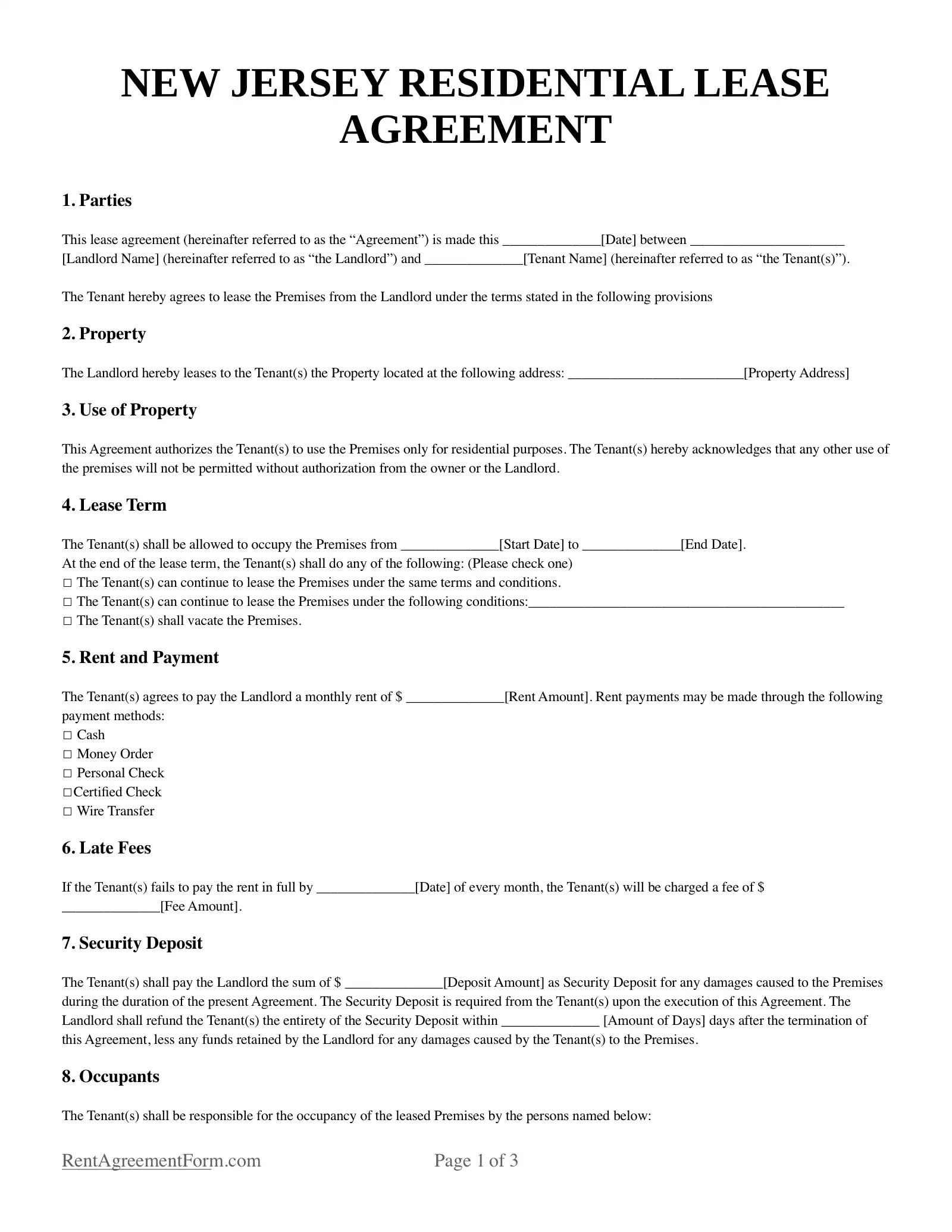New Jersey Residential Lease Agreement Form
A New Jersey Residential Lease Agreement Form is a binding document between the landlord and the tenant that outlines the terms of a residential property lease, such as an apartment or a house. This is different from a New Jersey rental application.
The NJ lease agreement serves as a rental contract. It states that the landlord, known as the lessor, grants temporary occupancy of their residential property to the tenant, known as the lessee, in exchange for periodic payments. The payment is usually every month unless stated otherwise in the agreement.
Among the standard provisions under a residential lease agreement are the monthly rental, the tenant’s occupancy period, and some regulations on the use of the property. One notable provision in the residential lease agreement pertains to animals—what types and how many pets are allowed on the property. All the typical provisions are included in the NJ lease agreement template below.
Usually, there is also a provision for late charges in the event that the tenant fails to pay their rent on time.

Required Disclosures in a NJ Residential Lease Agreement
- Truth in Renting Guide - The landlord should provide a copy of the Truth in Renting guide to the tenant to inform them of their rights in every rental agreement. If the Department of Community Affairs updated the guide, the landlord has 30 days to provide the tenant with a copy
- Flood Zone Notice - The landlord should inform the tenant if the property is in a flood zone in the form of an official notice included in the rental agreement. This must be relayed to the tenant before occupancy
- Child Protection Window Guards - If tenants have children under 10 years old, they can request that the landlord provide protective guards on windows to protect them from falling. This option should be included in the rental agreement as a way to inform the tenant that they can request such an improvement
- A window guard, usually metal grills, should be installed if the first-floor window is more than six feet above the ground. The height is measured from the ground to the bottom of the window
- Lead-Based Paint - There is a national law that requires the disclosure of known lead-based paint hazards in homes built before 1978. In New Jersey, landlords are required to do the following:
- Attach a lead-based disclosure form to the lease agreement
- Give the tenant some educational resources approved by the Environmental Protection Agency to inform them about the dangers of lead-based paint
Rent Grace Period
There is a rent grace period in New Jersey. In general, tenants have a grace period of five business days before a late charge will be imposed in the event they fail to pay rent on time (NJ Rev Stat § 2A:42-6.1).
Security Deposit Laws in New Jersey
The landlord collects a security deposit from the tenant after signing the lease agreement. This may cover the tenant’s last rent when they move out or cover the expenses for repairs in the case of damage to the property.
While the security deposit is the tenant’s money, it is in the hands of the landlord. The landlord may invest the money in a money market fund or deposit it in a New Jersey bank.
The security deposit should not be more than one and a half times the monthly rent. According to New Jersey law, after the termination of the contract, the landlord has 30 days to return the deposit to the tenant (NJ Rev Stat § 46:8-21.1).
By including these details in the residential lease agreement, New Jersey landlords guarantee transparency and protect themselves and the tenant.